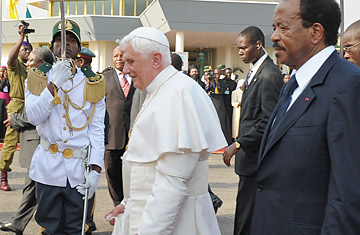
Pope Benedict XVI is greeted by Cameroon President Paul Biya at the airport in Yaoundé on March 17
Popes don't need to worry about approval polls, but Benedict XVI must have been happy on Tuesday to leave the Vatican for a weeklong visit to Cameroon and Angola, his 11th trip abroad as Pope yet his first to Africa. Almost everyone, including supporters, acknowledges that Benedict's controversial decision in January to lift the excommunication of four bishops from a defiant, ultra-traditionalist faction — including a Holocaust denier — caused unprecedented damage to his leadership of the 1.1 billion–strong Catholic Church. Indeed, in a letter to bishops last week, the Pope both openly admitted to errors in managing the affair and laid blame on some inside the church for undermining him.
"He's got to feel besieged," a Vatican official says of the Pope. Many offices within the Holy See, according to this source, are now working "in great fear" of making further missteps (which have recently included controversies in Brazil and Austria). "The right hand doesn't know what the left hand is doing," he says. The good news on Tuesday, at least, was that Benedict's Alitalia flight lifted off on time. (See pictures of the Supreme Pontiff.)
Whatever he encounters over the next seven days, Benedict will certainly appreciate a break from the goings-on in Rome. Africa, where the faith is fervent and the Pope always popular, is a chance for Benedict to put some space between himself and the troubles back at headquarters. He landed in Yaoundé, Cameroon, late Tuesday to an adoring crowd of young and old alike, waving Vatican flags and pictures of the white-haired German, who turns 82 next month. Indeed, Africa is where the Roman Catholic Church is expanding most rapidly in the world, typically with a more devout approach to the faith. Over the past three decades, Catholics have tripled in Africa, totaling some 18% of the continent's population; within the next 25 years, African Catholics are expected to outnumber European Catholics.
Pope John Paul II made evangelizing the Southern Hemisphere a priority of his papacy, visiting Africa 12 times, drawing massive crowds and presumably converting some with his charismatic presence. Benedict hopes to repeat the big crowds, particularly in an open-air mass in Luanda, Angola, on Sunday, though it remains an open question whether this Pope has the same powers of persuasion as his predecessor.
On Thursday, Benedict will meet with leaders of Cameroon's Muslim community. He is likely to stress how the central African nation has lived recently in relative peace among different faiths. Another priority of this trip is to prepare for a rare synod of African bishops in Rome next fall.
Of course, because the Pope is involved, controversy follows. The perennial source of it for the church in Africa was addressed on the papal plane departing from Rome on Tuesday, as Benedict repeated the Vatican's long-standing opposition to the distribution of condoms, saying it actually hindered the fight against AIDS in Africa. The church says AIDS should be combated through sexual abstinence and reinforcment of the traditional family. But that is the standard Catholic line. In this case, Benedict has the rest of the church hierarchy behind his opinion.
